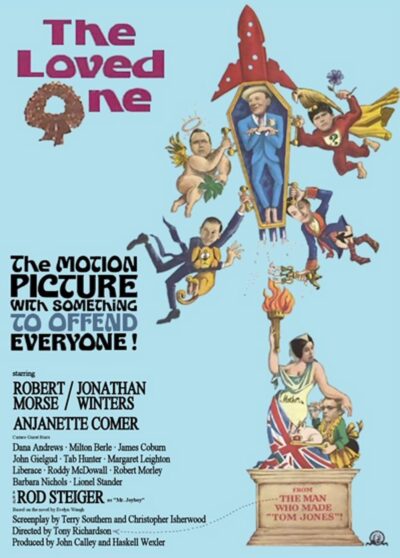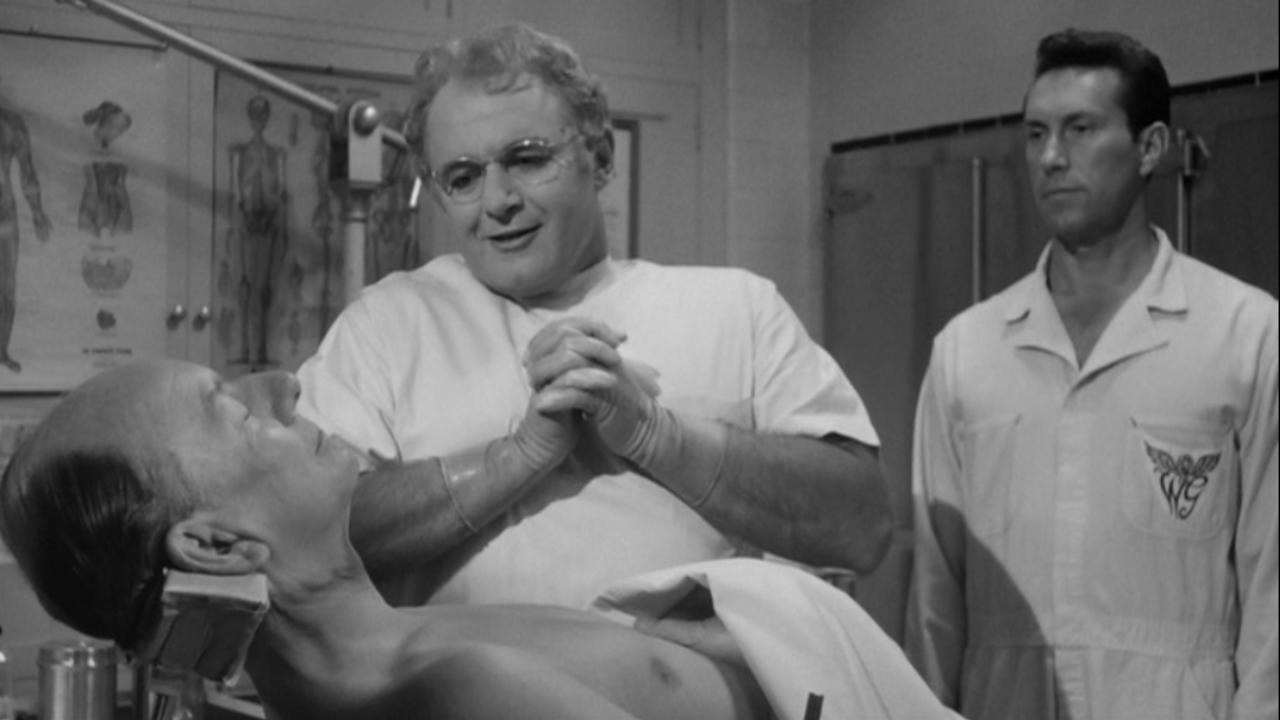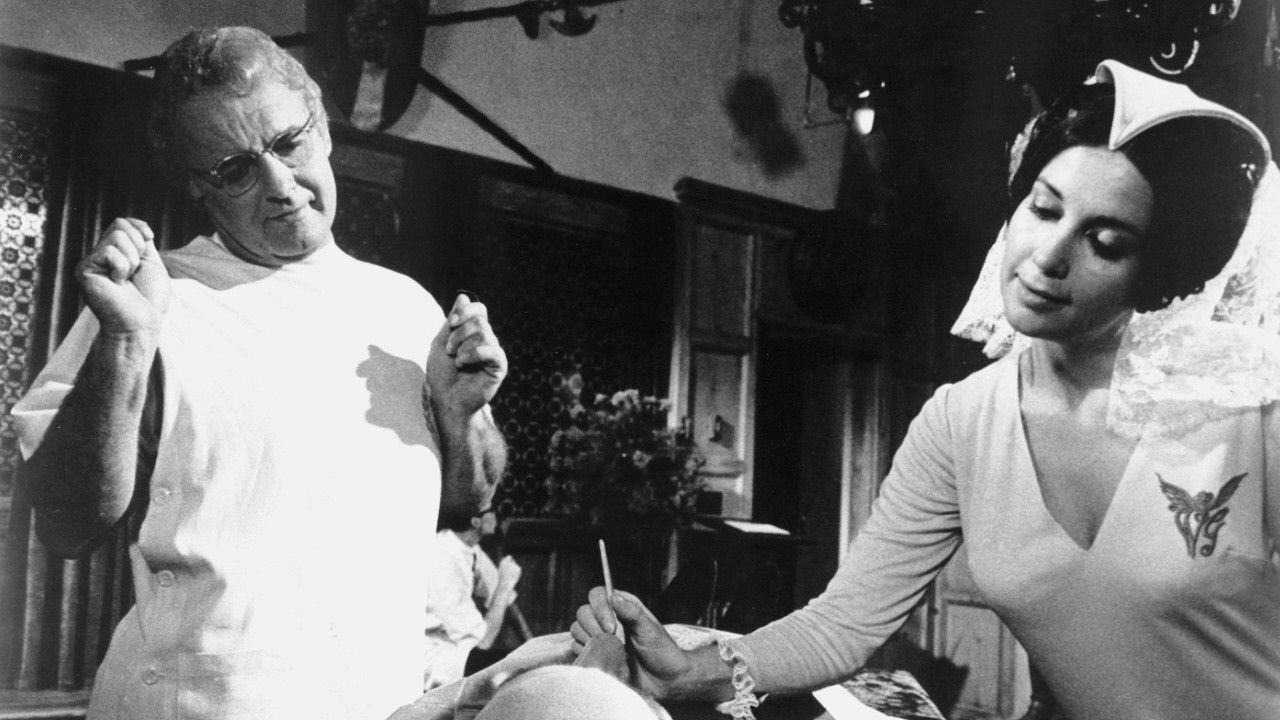 “The Motion Picture with Something to Offend Everyone!” So claimed the one sheet for THE LOVED ONE, a 1965 adaptation of Evelyn Waugh’s 1948 novella of the same name. Waugh (who really hated this movie) sought to satirize Hollywood and the American funeral industry in a novel that was considered quite shocking in its day. This film, which followed a long line of attempted adaptations (including one proposed by Luis Buñuel), was likewise quite a shocker when initially released.
“The Motion Picture with Something to Offend Everyone!” So claimed the one sheet for THE LOVED ONE, a 1965 adaptation of Evelyn Waugh’s 1948 novella of the same name. Waugh (who really hated this movie) sought to satirize Hollywood and the American funeral industry in a novel that was considered quite shocking in its day. This film, which followed a long line of attempted adaptations (including one proposed by Luis Buñuel), was likewise quite a shocker when initially released.
“The Motion Picture with Something to Offend Everyone!”
It was British filmmaker Tony Richardson’s follow-up to his 1963 breakthrough TOM JONES, and as with many a prominent filmmaker following up a successful film he went over budget and ended up with a massive flop that (initially) pleased nobody; it’s been said that several MGM executives walked out of an industry screening long before it was over. In retrospect THE LOVED ONE can be viewed as one of the first of the counterculture-infused screeds (such as BLOW UP and EASY RIDER) that would proliferate in the latter part of the decade. It was, in short, far ahead of its time.
…far ahead of its time.
Dennis Barlow (Robert Morse) is a young English poet who arrives in America to stay with his wealthy uncle (John Gielgud). The latter hangs himself shortly after Dennis arrives, forcing him to visit the luxurious Whispering Glades funeral parlor. This place is run by the “Blessed Reverend” Glenworthy, who spends his days hovering over the place in a black helicopter; Glenworthy’s twin brother, meanwhile, runs a nearby pet cemetery where Dennis finds employment.
Along the way he falls in love with Aimee Thanatogenous (Anjanette Comer), who works for Whispering Glades as a cosmetician and is, frankly, insane. She constantly switches her affections between Dennis and Whispering Glades’ resident embalmer Mr. Joyboy (Rod Steiger), with her choices based entirely on the dictates of a newspaper psychic known as the Guru Brahmin—actually a pair of smart-assed columnists (Lionel Stander and Bernie Kopell) who intentionally give her bad advice. That advice inevitably comes to include suicide (the Greek word Thanatogenous, FYI, means “Death by Bleeding”), thus adding another cadaver to Whispering Glades’ illustrious retinue, and allowing for a new rocket-based method of corpse disposal.
That advice inevitably comes to include suicide (the Greek word Thanatogenous, FYI, means “Death by Bleeding”)…
The modern viewer may have a difficult time figuring out what’s so offensive about this film, but it was known to clear many a theater. The irreverent sense of humor, bequeathed by a script by sixties satirist extraordinaire Terry Southern (DR. STRANGLOVE, CANDY) and novelist Christopher Isherwood (a longtime rival, ironically enough, of Evelyn Waugh) was quite unprecedented for its day (it would likely be called “Python-esque” now).
The irreverent sense of humor, bequeathed by a script by sixties satirist extraordinaire Terry Southern (DR. STRANGLOVE, CANDY) and novelist Christopher Isherwood (a longtime rival, ironically enough, of Evelyn Waugh) was quite unprecedented for its day (it would likely be called “Python-esque” now).
So too the immediacy of the visuals. Co-producer/cinematographer Haskell Wexler’s luminous black and white photography is marked by handheld camerawork more in vogue with the new wave film movements of France and other countries than mainstream Hollywood of the mid-sixties, something Wexler would take much further in films like MEDIUM COOL and ONE FLEW OVER THE CUCKOO’S NEST (while on the subject of iconic film folk who crewed on THE LOVED ONE, one of its two editors was Hal Ashby, the future director of HAROLD AND MAUDE and SHAMPOO).
Directorially, Tony Richardson was nothing if not ambitious. He aimed not only to satirize Hollywood and the California funeral industry, but America itself (note the use of “America the Beautiful” over the opening and closing credits). This makes for a massively overblown product, as is evident in the inflated 122 runtime and overdone production design, which lessens the brilliance of Wexler’s cinematography. Richardson and his collaborators can’t seem to decide whether Whispering Glades, which looks like LA’s iconic Forest Lawn cemetery crossed with the décor of LAST YEAR AT MARIENBAD, is supposed to be creepily opulent of just plain creepy.
The cast, at least, is a 1960s movie lover’s wet dream. Featured are Jonathan Winters, Rod Steiger, Dana Andrews, Roddy McDowell, Tab Hunter, Liberace (in his final film role), Barbara Nichols, Milton Berle and James Coburn. Richardson, in deference to his heritage, also cast the distinguished British thespians John Gielgud and Margaret Leighton (as well as Ruth Gordon and Jayne Mansfield, neither of whom made the final cut).
The cast, at least, is a 1960s movie lover’s wet dream.
Also worthy of note are the late Robert Morse (then known primarily for his stage rather than screen work) as Dennis; Anjanette Comer, a newcomer who adequately embodies both the quirkiness and the sexiness of Aimee (outside of this film Comer is best known for her turn in THE BABY, to which THE LOVED ONE’S tagline applies equally well); and, in his film debut, Paul Williams (PHANTOM OF THE PARADISE), who was 23 at the time but played a character who was much younger—a character, I might add, who wasn’t in the Waugh text but adds a space age angle that was quite contemporary in 1965. Now, obviously, the word “contemporary” has no place in any discussion of this film, to which time has long since caught up.
Vital Statistics
THE LOVED ONE
Metro Goldwyn Meyer
Director: Tony Richardson
Producers: John Calley, Haskell Wexler
Screenplay: Terry Southern, Christopher Isherwood
(Based on a novel by Evelyn Waugh)|
Cinematography: Haskell Wexler
Editing: Hal Ashby, Brian Smedley-Aston
Cast: Robert Morse, Jonathan Winters, Anjanette Comer, Rod Steiger, Dana Andrews, Milton Berle, James Coburn, John Gielgud, Tab Hunter, Margaret Leighton, Liberace, Roddy McDowall, Robert Morley, Barbara Nichols, Lionel Stander, Roxanne Arlen, Dort Clark, Pamela Curran, Robert Easton, Ayllene Gibbons, Don Haggerty, Chick Hearn, Paul Williams


